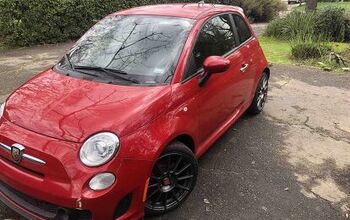News Round-up: Auto Payola Continues, Naturally Aspirated Engines Are Dead, and BMW Is Getting in Touch With Your Feelings

In a business that hocks products worth tens and hundreds of thousands of dollars, you’d hope the professionals reviewing those products would provide facts and honest, valuable personal opinions to readers.
Those hopes have never fully panned out in the automotive industry, as we learned most recently with CleanMPG’s Wayne Gerdes a few months ago and a scathing story that detailed an OEM paying a social media influencer $300,000 for a few photos.
But how pervasive is the payola problem in automotive journalism? And do you even care?
That, Mercedes proclaims turbochargers are the future, and woke bae BMW wants to build your safe space … after the break!
Pay up, sucka!
As do most things that are wrong in the automotive industry, the latest revelation that nobody’s publicly talking about began in the Automotive Industry group last week.
Spy-shot legend Brenda Priddy had this to say:
I just had an interesting chat with an editor/writer/blogger that casually mentioned that he’s received “several hundred dollars” from car companies when he attends car launches. Is this the new norm for certain categories of journalists in this industry? Thoughts?
The ensuing comment thread includes some major heavy hitters in the automotive industry proclaiming their surprise or distaste — but not necessarily their disgust. As expected, no names are named, and no articles have been written. The automotive industry, including complicit journalists who believe outing an OEM for paying journalists will ruin their own careers, will continue to sweep the payola problem under the rug like a well-oiled Second on a curling team.
And it isn’t like the public is up in arms about it either, so why bother telling the truth, right?
Well, we believe in the truth. TTAC writers accept trips, which includes accommodation, meals, and other liquid benefits associated with those trips — but we will never accept cash to line our pockets.
If you know someone who has, you have our undivided attention.
Mercedes powertrain engineer: naturally aspirated engines are dead
In an interview with CarAdvice, Daimler’s head of powertrains, Bernhard Heil, said the writing’s on the wall for naturally aspirated engines.
“I personally believe that [the naturally aspirated engine] is a done thing.” Heil told CarAdvice at last week’s Mercedes-Benz technology day in Stuttgart.
With ever stringent fuel-economy regulations but a need for more power, turbocharged four-cylinder engines are the future — whether we like it or not.
“If you’re talking about 200kw for a [2.0-litre] four-cylinder engine, you will end up in a situation that you will need a V8 4.0L naturally-aspirated engine – and you will never end up in real-life fuel economy with a V8 offering comparable numbers to a four-cylinder,” he said.
The future will be a dull place to live.
BMW wants to know how your day is going because it cares, baby
As technology companies continue to push the boundaries of what was once thought possible with artificial intelligence, BMW is looking to put those advancements into action by building cars that can discern how you feel.
“Just imagine you get into your car and it recognizes straight away what mood you’re in, probably quicker than your spouse,” BMW CEO Harald Krüger said to Automotive News.
As BMW looks into the future, it believes mobility will be “tailor-made for all our customers’ individual needs,” he continued.
I don’t need a car to adjust transmission shift ferocity dependant on my mood, BMW, but you could make seat- and mirror-position memory standard on all your cars. That would be greaaaat. Thanks guy.
[Image Source: DailyTurismo]
Mark Stevenson is the managing editor of The Truth About Cars. He is easily swayed into buying vehicles from brands that no longer exist. You can find him on Twitter and Facebook.

More by Mark Stevenson
Latest Car Reviews
Read moreLatest Product Reviews
Read moreRecent Comments
- Syke F1 fan and normally watch every race, although most of them are DVR'd. I've got my Xfinity box set up to record everything automatically. This past Sunday I watched the race live for a change.
- Jalop1991 There is no inflation. Everything is cheaper than it was 5 years ago. SHRIMP AND GRITS!
- ChristianWimmer Exterior and interior look pretty flawless for such a high mileage car. To me this is an indication that it was well-maintained and driven responsibly. It’s not my cup of tea but it’s bound to find an enthusiastic owner out there.And with ANY car, always budget for maintenance.
- Fred I'm a fan and watch every race. I've missed a few of the live races, but ESPN repeats them during more reasonable hours.
- Mikesixes It has potential benefits, but it has potential risks, too. It has inevitable costs, both in the price of the car and in future maintenance. Cars with ABS and airbags have cost me at least 2000 bucks in repairs, and have never saved me from any accidents. I'd rather these features were optional, and let the insurance companies figure out whether they do any good or not, and adjust their rates accordingly.



































Comments
Join the conversation
Mark...Yes ....It "should " ...be. I guess that's why , we read TTAC....eh ?
Unless things have changed dramatically over the past few years, gas burning experimental hypermiling streamliners still use NA engines. Very narrowly tuned and geared specifically to be in the right load and rpm range for sure; but with ever more gears available from ever more efficient and quick shifting transmissions/cvts in production cars, turbos may loose even some of their EPA superiority. The main thing turbos do in contemporary cars, is introduce an additional degree of freedom wrt tuning. So that EPA type tests can be gamed easier, without the end user having to use his gear box for when he needs more acceleration. For any X hp, an optimized NA engine can be designed to deliver that X at least as efficiently as a turbo. It may still be true that for the spread of power buyers desire, a modern turbo can be made more efficient than an NA. But that difference is slight. And noone cares much, because the EPA's tests are so ridiculously narrow, myopic and gameable, and gaming those is here all the effort is being expended.